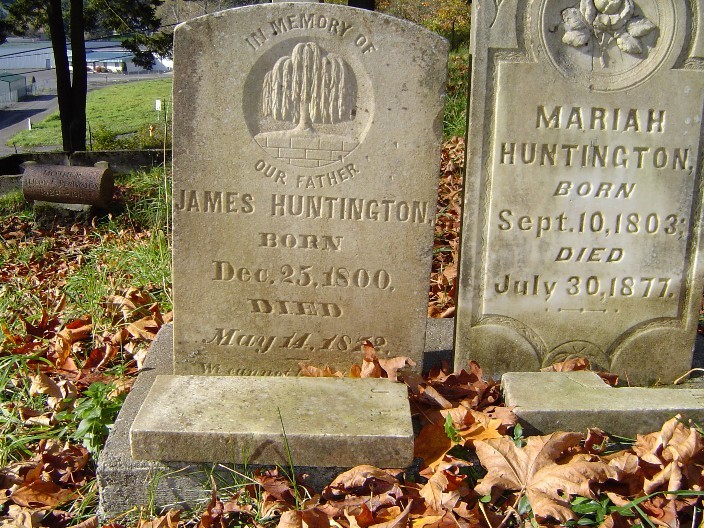The county's first sheriff, James S. Huntington Sr., had both pioneering and civic duty in his blood.
The first Huntingtons in America emigrated from England in 1633. James Huntingon's grandfather, Samuel Huntington, was one of the signers of the Declaration of Independence.
James S. Huntington's parents were Jacob and Martha (Lindley) Huntington. He married Mariah Bowler on October 14, 1821 in Chilo, Clermont, Ohio.
In 1852, James and his wife, Mariah, came west in a 17-wagon caravan that included James's brothers, William, Benjamin and Jacob. James settled across the river from his cousin Harry Darby Huntington's town of Monticello, and the other brothers settled around the area that became Castle Rock. One of James's sons, William, settled in Shanghai, later called Rose Valley.
In "Shanghai Memories" by Phil Reese, written in 1922 for the Cowlitz Historical Quarterly, he recalled his "Uncle Jim":
"(He) was the most lovable and loving man ever knew; also the most interesting. He was the soul of wit that was devoid of any sting. ... He was very fond of (Scottish poet) Robert Burns and I loved to hear him recite."
When Cowlitz County was created in 1854, the commissioners appointed James, 53, as its first sheriff, to hold the office until the general election in 1855.
He was reappointed sheriff in 1856 following the resignation of Sheriff Ziba Miller. He also served as justice of the peace and country treasurer.
His brothers William and Benjamin both served in the territorial legislature. William also served as a U.S. marshal of the territory from 1861 to 1869.
In 1866, James and his son-in-law, William Hays, won the contract for a territorial insane asylum. He built a "home for the insane and idiotic" on his property, in what is now South Kelso, and operated it from 1866 to 1871 with the help of his son, Daniel.
Although an inspection board after it opened said the patients appeared to be well-cared for, social reformer Dorothea Dix inspected the asylum in 1869 and described conditions there as "filthy ... inadequate ... irresponsible."
When Huntington's contract expired in 1871, the territory moved the 15 patients to Fort Steilacoom, site of the present-day Western State Hospital.
Huntington was killed in 1872 after being pulled under a Northern Pacific train passing between his barn and his house. He had sold the railroad the right-of-way for $1 the previous year.
He is buried in Catlin Cemetery.
Read more: http://tdn.com/profile-sheriff-james-s-huntington-sr/article_be5651b8-f510-11de-ba75-001cc4c03286.html#ixzz1kdTEQki6
The county's first sheriff, James S. Huntington Sr., had both pioneering and civic duty in his blood.
The first Huntingtons in America emigrated from England in 1633. James Huntingon's grandfather, Samuel Huntington, was one of the signers of the Declaration of Independence.
James S. Huntington's parents were Jacob and Martha (Lindley) Huntington. He married Mariah Bowler on October 14, 1821 in Chilo, Clermont, Ohio.
In 1852, James and his wife, Mariah, came west in a 17-wagon caravan that included James's brothers, William, Benjamin and Jacob. James settled across the river from his cousin Harry Darby Huntington's town of Monticello, and the other brothers settled around the area that became Castle Rock. One of James's sons, William, settled in Shanghai, later called Rose Valley.
In "Shanghai Memories" by Phil Reese, written in 1922 for the Cowlitz Historical Quarterly, he recalled his "Uncle Jim":
"(He) was the most lovable and loving man ever knew; also the most interesting. He was the soul of wit that was devoid of any sting. ... He was very fond of (Scottish poet) Robert Burns and I loved to hear him recite."
When Cowlitz County was created in 1854, the commissioners appointed James, 53, as its first sheriff, to hold the office until the general election in 1855.
He was reappointed sheriff in 1856 following the resignation of Sheriff Ziba Miller. He also served as justice of the peace and country treasurer.
His brothers William and Benjamin both served in the territorial legislature. William also served as a U.S. marshal of the territory from 1861 to 1869.
In 1866, James and his son-in-law, William Hays, won the contract for a territorial insane asylum. He built a "home for the insane and idiotic" on his property, in what is now South Kelso, and operated it from 1866 to 1871 with the help of his son, Daniel.
Although an inspection board after it opened said the patients appeared to be well-cared for, social reformer Dorothea Dix inspected the asylum in 1869 and described conditions there as "filthy ... inadequate ... irresponsible."
When Huntington's contract expired in 1871, the territory moved the 15 patients to Fort Steilacoom, site of the present-day Western State Hospital.
Huntington was killed in 1872 after being pulled under a Northern Pacific train passing between his barn and his house. He had sold the railroad the right-of-way for $1 the previous year.
He is buried in Catlin Cemetery.
Read more: http://tdn.com/profile-sheriff-james-s-huntington-sr/article_be5651b8-f510-11de-ba75-001cc4c03286.html#ixzz1kdTEQki6
Family Members
-
![]()
Daniel Lindsay Huntington
1822–1891
-
![]()
William Olmskirk (Ormskirke) Huntington
1824–1915
-
![]()
Martha Huntington Hayes
1828–1906
-
Ozi Curtis "OC" Huntington
1829–1910
-
James S. Huntington Jr
1834–1919
-
Lydia Huntington
1837 – unknown
-
![]()
Samuel Joseph Huntington
1841–1921
-
![]()
Joseph H. Huntington
1846–1849
-
Annette Huntington
-
Jacob Huntington
Advertisement
Records on Ancestry
Advertisement















